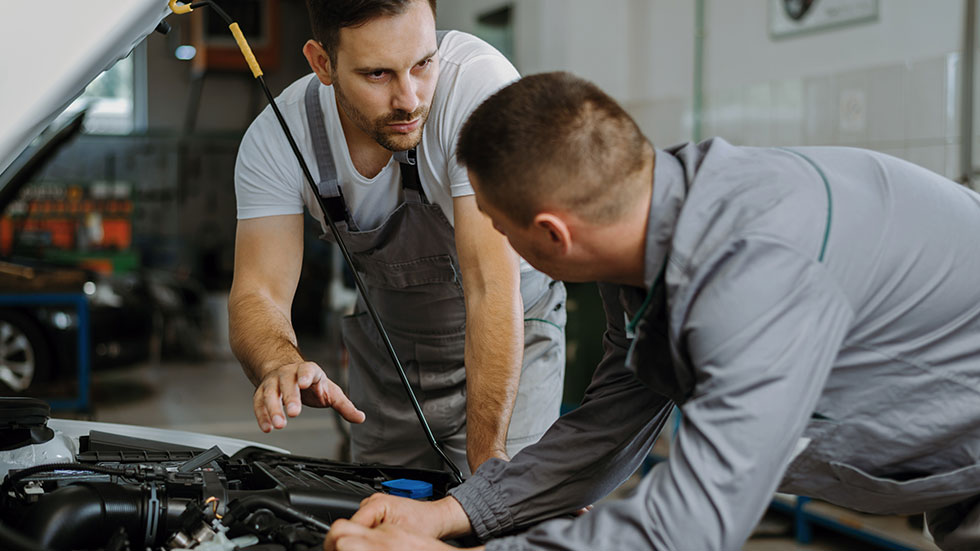Vehicle Noises You Should Never Ignore
Prevent dangerous driving and expensive repairs


Anyone on a budget who has ever owned a vehicle knows the feeling when an unfamiliar noise or vibration comes from their car. While the first thought may be, “how much is this going to cost me?” the second thought is often “… maybe it will just go away on its own.”
While some vehicle sounds may be one-offs that subside on their own, there are several that should never be ignored as they could lead to dangerous driving conditions or expensive (and avoidable) repairs.
Below are seven vehicle noises you should never ignore, what they indicate about your vehicle, and what course of action you should take.

Squealing when braking
Several things can cause brakes to squeal when you press the brake pedal. If you frequently drive off-road or on surfaces with dirt, salt and grime, these elements can make their way between your pads and rotors, causing a squeal. Another common cause is the warning feelers installed on brake pads to help drivers know when it is time to replace them.
Squealing while braking is usually not an emergency. However, drivers should never ignore this sound. Continuing to drive on squealing brakes can damage your pads, calipers, or brake rotors to the point where expensive repairs are required.
Humming or whining
These sounds can be vague and unsettling when you experience them, and while they may mean something small like a worn belt, humming or whining can also be early indicators of a failing transmission. To keep your vehicle running safely and avoid a roadside emergency, it is best to have these types of noises checked by your mechanic as soon as possible.
Snaps, pops, or clicks when turning
In front-wheel drive or all-wheel drive vehicles, a popping sound when turning a corner could mean that your CV (constant velocity) joints on your front end may need replacement. While not an emergency that needs to be addressed right away, driving with worn or failing CV joints could put undue stress on other delicate components in your steering assembly and lead to costly and avoidable repairs down the road.

Rhythmic clunking, tapping, or banging under hood
If you are hearing these noises, shut your vehicle off immediately and take it to a mechanic. Banging, clunking, or tapping sounds coming from a running engine usually means delicate (and expensive) metal components like valves, pistons, or rods are striking metal and could bend or break beyond repair. Engine repairs are among the most expensive and can even total some vehicles.
Booms when going over bumps
If you start hearing booms when you drive over speed bumps or feel like your vehicle's ride has gotten more harsh recently, this can be a good indicator that something in your suspension is broken. While not an emergency, drivers experiencing these noises should take their vehicle in for service immediately. Worn shocks and struts mean you will have less control over the vehicle. Plus, driving on broken components will wear down other healthy components, which could lead to costly repairs.

Hissing under the hood
While hissing noises can be a sign of several different vehicle issues, none of them should be taken lightly, particularly when these sounds are coming from under the hood. Hissing can be caused by a hose that has fallen off, or a leak in your vacuum or air lines. It can also be from worn belts under the hood. If you hear hissing, take caution when investigating as some liquids are extremely hot and can burn. Take your vehicle to a professional for repair as soon as possible.
Grinding while driving
Grinding sounds almost always evidence of worn or failing parts. Pay attention to when the grinding happens so you can isolate the cause. If grinding noises happen when stopping, this usually indicates an issue with your braking system—either pads, rotors, or calipers. Grinding noises while driving could be a sign of problems with your clutch or transmission, which are both expensive repairs if left unattended. See a mechanic as soon as you can.
Our vehicles are among the most expensive and vital investments you have, and paying attention to the noises, driving characteristics, and idiosyncrasies of your car is important for keeping you safe, and getting you where you need to go. When in doubt about a noise, seek a professional opinion from your mechanic—sooner rather than later.
